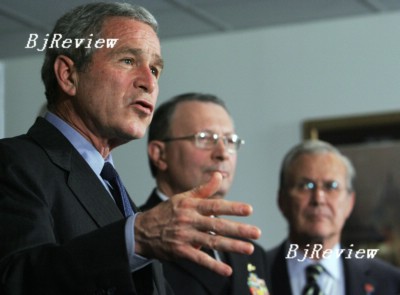
The United States has taken a number of steps against Iran recently, arresting and detaining five Iranian consular staffers in Erbil, north Iraq, freezing all the assets of Bank Sepah within the United States and sending a second aircraft carrier to the Gulf region. News reports predicting a U.S. military strike on Iran have run wild, with some Arabic media speculating that Washington has decided to launch an attack from the sea before April.
This tougher stance on Iran relates largely to the U.S. policy adjustment on Iraq announced on January 10. Many proposals were put forward to disentangle the United States from the quagmire of the Iraq war, but the Bush administration finally chose to send more troops, brushing aside the recommendation of the Iraq Study Group, which was to withdraw gradually and cooperate with Iran. This shows that Washington is determined to play tough until it has its way in Iraq and perhaps the entire Middle East. The recent action it has taken against Iran seems to be just part of that hard policy.
Harsh measures imposed by Washington on Tehran are connected with the Iranian nuclear issue. In the last two years, Iran has frequently crossed the "bottom line" as determined by the international community. UN Resolution 1737, which was passed last December imposing sanctions on Iran, was dubbed by Iranian President Mahmoud Ahmadinejad "a scrap of waste paper." The president also claimed that Iran would be in complete control of nuclear technology by February or March. If his predictions are fulfilled, the Middle East will be in a dangerous and comprehensive "nuclear race," as other Arab countries, aware suddenly of an impending crisis, have also hammered out their own nuclear plans. Washington has to declare its position quickly on the Iranian nuclear issue; it must decide whether to compromise or initiate a showdown.
In America's eyes, an Iran in possession of nuclear technology leading a "new Middle East" would seriously threaten U.S. core interests. First, Iran's nuclear capability and its anti-U.S. policy worry Washington profoundly; second, a nuclear-equipped Iran poses a huge threat to Israel, an ally of the United States in the Middle East. On top of that, Iran enthusiastically supports anti-U.S. forces in the Middle East, such as Hezbollah, and around the globe. The United States is concerned enough to develop aggressive intentions and its timetable on the Iranian nuclear issue has continuously sped up.
As a matter of fact, ever since Iran's Islamic Revolution in 1979, the nation has remained a thorn in the side of the United States. A move against Iran-the next target dished out by U.S. think tanks-has been delayed only by U.S. problems in Iraq. But now, action against Iran is a natural part of Washington's harsh stance in the Middle East, which it is determined to stick to.
Some analysts say that the American influence contributed considerably to the current Iranian nuclear issue. Shortly before and after the United States launched the Afghan war, Iran lowered its profile and actively cooperated with the United States, but the Bush administration showed no gratitude. Instead, Bush named Iran part of the "axis of evil" in a 2002 speech, which partly led to Ahmadinejad, a diehard opponent of the United States, taking power.
U.S. preemptive strikes against Iraq, made without solid justification, resulted in survival crisis in Iran and increased the need for nuclear capability. Now, Washington finds itself in a tit-for-tat situation with Iran. Iran will be a far more challenging opponent than Iraq, considering the size of its territory and population, its national and military strength as well as geographical location.
The Bush administration's determination to get involved in Iraq was widely regarded as a political gamble; today, its decision to settle all accounts, old and new, with Iran, would doubtlessly trigger another round of political games that can only be even more perilous.
(Copyright People's Daily Online)
The author is a researcher with the Institute of Asian and African Studies, China Institutes of Contemporary International Relations
| 